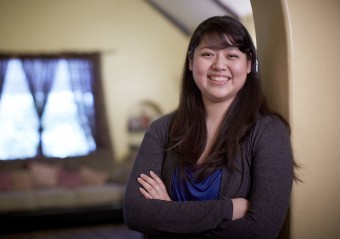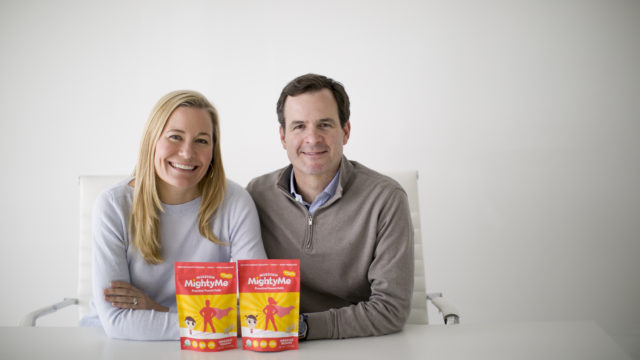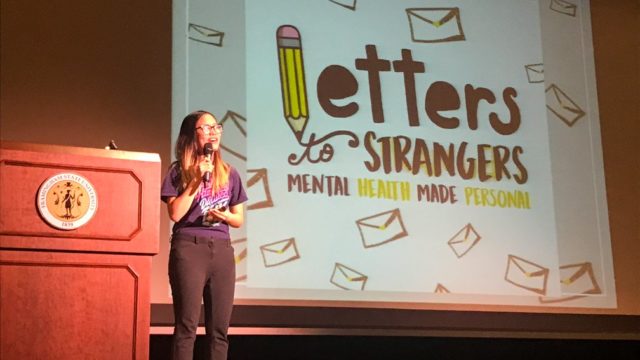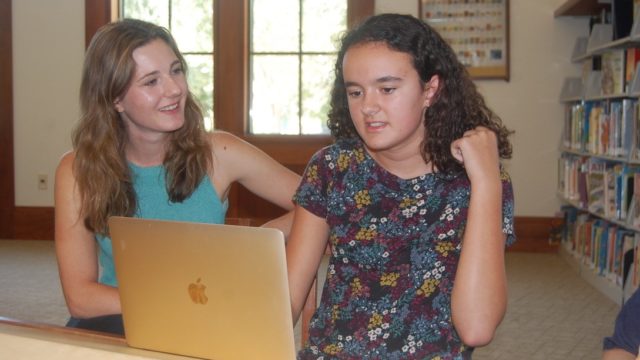Speaking Up for Girls Who Don’t Have a Voice
Rocio Ortega is a passionate advocate for the 600 million girls in developing countries who do not have the opportunities she’s had in the U.S. As a high school sophomore, she was first exposed to the concepts of female empowerment and feminism through GlobalGirl Media, a nonprofit organization that teaches the tools of digital media to teenage girls in underserved communities. GlobalGirl Media’s goal of inspiring community activism and social change via digital journalism appealed to Rocio and led her to report on the International Women’s Media Conference in Washington, DC, which gave her the “biggest exposure of my life.”
“At the conference I was paired with a girl from South Africa, who told me about her life” she recalls. “She wanted to go to school, but couldn’t because of where she lives. I realized I had to do something about this problem, but I didn’t know how.”
When she returned to her high school in East Los Angeles, Rocio began researching ways she could make a difference and found Girl Up, a campaign by the United Nations Foundation. Girl Up gives American girls the opportunity to become global leaders and channel their energy and compassion to help some of the world’s hardest-to-reach adolescent girls.
 “I started a Girl Up Club in my high school to raise awareness and funds for girls in Malawi, Ethiopia and Guatemala,” she explains. “It was shocking to me, but people in my Latino community had never thought about the need to educate and help women in developing countries. Through Girl Up, we introduced the words, ‘female empowerment’ and ‘feminism’ to my community and people began to get on board.”
“I started a Girl Up Club in my high school to raise awareness and funds for girls in Malawi, Ethiopia and Guatemala,” she explains. “It was shocking to me, but people in my Latino community had never thought about the need to educate and help women in developing countries. Through Girl Up, we introduced the words, ‘female empowerment’ and ‘feminism’ to my community and people began to get on board.”
After organizing the club, Rocio wanted to do more and was subsequently named a Teen Advisor for the national Girl Up campaign. Her larger role in the organization took her back to Washington, DC, and other places, accompanying girls who were just as passionate about raising awareness. Along the way, she worked for passage of child marriage legislation in California, interned for U.S. Congresswoman Grace Napolitano and served as a U.S. House of Representatives Page. Now, as a student at Wellesley College, she serves Girl Up as Youth Champion, educating people on campus and in the wider community about women’s issues in developing countries.
Rocio credits her selection as a Coca-Cola Scholar with expanding her voice. At her 2012 Scholars weekend, she sat next to Jeff Kallay, consultant for TargetX , and told him her story of being a first generation Mexican American who has been fortunate to be educated because she was born in this country. Her passion and commitment to helping less fortunate women in developing countries prompted Jeff to nominate her to give a TED talk and she subsequently spoke at the TEDx Youth at San Diego Conference.
In her TEDx talk, Rocio eloquently outlines the need to invest in girls’ education and shares her personal story of fighting the traditional values of her own Latino community and family to attend a school so far from home.
“It’s not that I didn’t trust the decisions my family had made for me, but it was my time to make my own decisions,” she says. “I knew I had to speak up about that, too, and the TEDx talk gave me a great venue.”
At Wellesley, Rocio is comfortable and confident expressing herself about issues that are dear to her heart. She is also grateful to be attending the alma mater of one of her role models, Hillary Clinton. In addition to her work for Girl Up, she is involved with other organizations that advocate for diversity and political justice for women of color.
After college, she hopes to volunteer for the Peace Corps, then work for a member of Congress with the ultimate goal of running for office to represent her community. She also plans to continue to help girls abroad have access to greater opportunities.
“If you invest in a girl, you’re investing in the future and that’s what the Coca-Cola Scholars Foundation has done for me,” she explains. “The Coca-Cola Scholars Foundation is already shaping the future by giving opportunities to people like me who want to do more – it gives us a helping hand to progress, not for ourselves, but to help others.”




